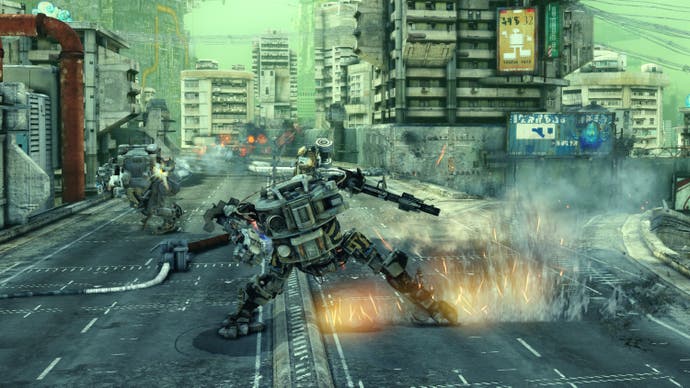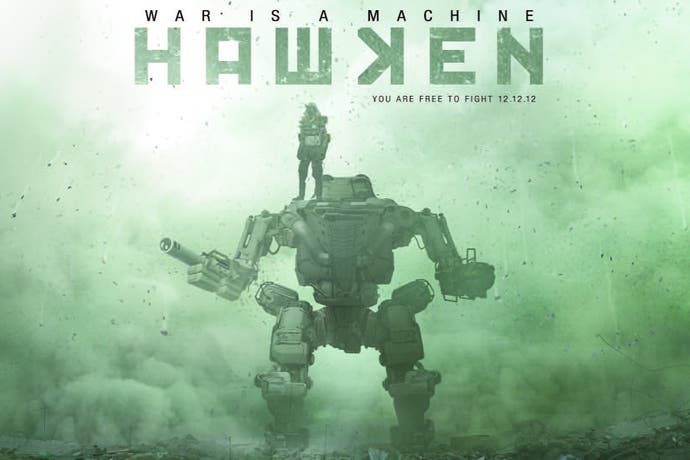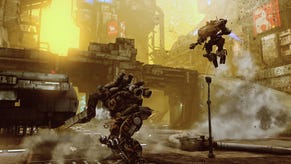"Free-to-play will change everything."
Hawken's publisher Mark Long on the free-to-play future, and his game's part in it.
Hawken's already made a splash, even before its open beta began earlier this week. When the trailer for Khang Lee's vision of a future corrupted by nano-viruses and patrolled by angry, sexy mechs debuted last April, the world watched in awe. And the games industry watched in envy, beginning a long courtship period between several publishers and the independent developer Adhesive.
"Like everyone else I saw it first on YouTube in April last year, and I was blown away," says Mark Long, a veteran who's worked throughout the industry, most notably forming Zombie Studios, developers of the early Spec Ops games among others. "I asked a friend that knew the art director Khang Lee, so I asked to be put in touch with him. I became friends with Khang, and began advising Adhesive as they were negotiating with various publishers who were talking to them."
Long succeeded where other bigger names had failed in wooing Adhesive, although he had the backing of someone behind one of the biggest names in gaming. "I was steering them towards free-to-play, and the venture capitalist who helped fund Riot and League of Legends was chasing them, and I brought everybody together and formed publisher Meteor as a result."
"The Adhesive guys were interested in the least friction - but we convinced them that the game could be much bigger than just an XBLA game. There's a very limited audience there. XBLA's a great place to publish, but we convinced them they could become masters of their own destiny, form their publisher and then go on to do other titles rather than working for the man."
Hawken's no longer an XBLA game. It's playable for free right now on PC, its economy boosted by microtransactions that, while currently limited to cosmetic upgrades, will eventually branch out to offer a little extra convenience, and a way for players to support their own clans and hire their own servers.

So how did Long manage to step ahead of the big publishers to land Hawken? Maybe it's down to his starkly realist vision of the future, and his willingness to think beyond current models. "I see a future very near-term where you'll have super-tablets that you'll be able to play Hawken with on a Bluetooth controller," he says. "You'll be able to play it on your TV by hooking it up. I think ultimately the tablet will become the hardcore console."
It's not explicitly on tablets yet - although the team has played it on an Android tablet thanks to the wonder of Gaikai - and nor, right now, is it on console. It may have started as an XBLA game, but there's no word on it returning, and Long's unwilling to make a statement either way on whether it has a future there.
"Right now, PC is the place to be for a variety of reasons. We're between console cycles, and traditionally PC gaming spikes then. Also there's an emergence of gamers in places of the world that have never really played before like Brazil, Turkey, the Middle East, Russia, Poland.
"You can play it with a controller now. Increasingly, what is a console experience? It's a little difficult to define. I see maybe not the coming generation, but the one after, to be just Xbox as a service. What we're looking at, in free-to-play, is the unbundling of media. Videogames are one of the last things that you get in your car and drive to a store to buy."
Free-to-play has become a core part of Hawken's model, and while Long's a firm believer that a free-to-play future awaits the industry, he acknowledges that for the hardcore that the game's aimed at, that's fast become a dirty term. "It's not that hardcore players resist the idea of free-to-play," he insists. "It's that what exists in free-to-play mobile and social, it's things like Farmville which are terrible. They're not games, they're compulsion loops - you spend money to eliminate frustration, which is a great way to piss off your customers."
"But it doesn't follow that free-to-play doesn't belong in triple-A. If free-to-play didn't exist and we wanted to create a new IP like Hawken, it's extremely risky. It's kind of like the movie industry - the more money you spend, the more likely it is that you'll be successful, but those failures, when they happen, are catastrophic.
"I believe free-to-play is like the MP3 of our industry. It will change everything. You just can't compete with free. Music unbundled albums, and it radically changed the way that music was marketed, although sometimes not in a good way. The games industry could do with that, though. We're dominated by a couple of franchises - if Activision had their way they'd make three games a year until, well. We'd never stop playing."
So how do you sidestep some of the more negative connotations of the free-to-play model? "I think our entire philosophy is don't f**k the player over," Long bluntly replies. "Don't do a Zynga. Only sell what they'd want. There's customisation, a little bit of convenience in there and then eventually we're going to sell clan tools, the ability to run your own server. But right out of the gate, it's just customisation."
Of course, there are a growing number of free-to-play games that aren't viewed with disdain, and aren't treated like outcasts by the core gaming community. Indeed, one of the world's most popular games is free-to-play, and Hawken surely won't be harmed by association with it. With the backing from the same investor who's helped propel League of Legends to superstar status, it's inevitable that Meteor and Adhesive are leaning on their learnings.
"In many ways we're taking a page from that playbook. League of Legends is arguably a really geeky Dota mod. It's hugely successful, though. Our hope is that a first person shooter could be even more successful.
When you're talking about trumping a game that's got a strong claim to being the most played in the world, and that attracts some 12 million active players every day, that's no small claim. Can Hawken eventually eclipse or even equal the success of League of Legends?
"I want to say yes, but I don't what that to sound like hubris. But there's a 25 per cent year on year decline in console sales, and that's not just because the consoles are aging - it's really not about Hawken as much as it is about this massive disruption that's going on in the games industry."








